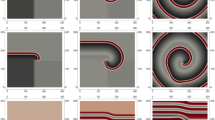Abstract
This paper introduces a numerical scheme for the time-harmonic Maxwell equations by using weak Galerkin (WG) finite element methods. The WG finite element method is based on two operators: discrete weak curl and discrete weak gradient, with appropriately defined stabilizations that enforce a weak continuity of the approximating functions. This WG method is highly flexible by allowing the use of discontinuous approximating functions on arbitrary shape of polyhedra and, at the same time, is parameter free. Optimal-order of convergence is established for the WG approximations in various discrete norms which are either \(H^1\)-like or \(L^2\) and \(L^2\)-like. An effective implementation of the WG method is developed through variable reduction by following a Schur-complement approach, yielding a system of linear equations involving unknowns associated with element boundaries only. Numerical results are presented to confirm the theory of convergence.



Similar content being viewed by others
References
Bossavit, A.: Computational Electromagnetism. Academic Press, San Diego (1998)
Brenner, S., Li, F., Sung, L.: A locally divergence-free interior penalty method for two-dimensional curl–curl problems. SIAM J. Numer. Anal. 42, 1190–1211 (2008)
Brenner, S., Cui, J., Nan, Z., Sung, L.: Hodge decomposition for divergence-free vector fields and two-dimensional Maxwell’s equations. Math. Comput. 81, 643–659 (2012)
Cai, W.: Computational Methods for Electromagnetic Phenomena: Electrostatics in Solvation, Scattering, and Electron Transport. Cambridge University Press, New York (2013)
Cai, W.: Finite Element Methods for Maxwell’s Equations. Oxford University Press, New York (2003)
Houston, P., Perugia, I., Schotzau, D.: Mixed discontinuous Galerkin approximation of the Maxwell operator. Technical Report 02-16, University of Basel, Department of Mathematics, Basel, Switzerland (2002)
Houston, P., Perugia, I., Schotzau, D.: hp-DGFEM for Maxwell’s equations. In: Brezzi, F., Buffa, A., Corsaro, S., Murli, A. (eds.) Numerical Mathematics and Advanced Applications: ENUMATH 2001, pp. 785–794. Springer, Berlin (2003)
Houston, P., Perugia, I., Schotzau, D.: Mixed discontinuous Galerkin approximation of the Maxwell operator. SIAM J. Numer. Anal. 42, 434–459 (2004)
Jin, J.: The Finite Element Method in Electromagnetics, 2nd edn. Wiley, New York (2002)
Monk, P.: Finite Element Methods for Maxwell’s Equations. Oxford University Press, New York (2003)
Mu, L., Wang, J., Ye, X.: Weak Galerkin finite element methods for the biharmonic equation on polytopal meshes. Numer. Methods Partial Differ. Equ. 30, 1003–1029 (2014)
Nedelec, J.: Mixed finite elements in R3. Numer. Math. 35, 315–341 (1980)
Nedelec, J.: A new family of mixed finite elements in R3. Numer. Math. 50, 57–81 (1986)
Perugia, I., Schotzau, D.: The hp-local discontinuous Galerkin method for low-frequency time-harmonic Maxwell equations. Math. Comput. 72, 1179–1214 (2003)
Perugia, I., Schotzau, D., Monk, P.: Stabilized interior penalty methods for the time-harmonic Maxwell equations. Comput. Methods Appl. Mech. Eng. 191, 4675–4697 (2002)
Vardapetyan, L., Demkowicz, L.: hp-adaptive nite elements in electromagnetics. Comput. Methods Appl. Mech. Eng. 169, 331–344 (1999)
Wang, C., Wang, J.: An efficient numerical scheme for the Biharmonic equation by weak Galerkin finite element methods on polygonal or polyhedral meshes. Comput. Math. Appl. 68, 2314–2330 (2014)
Wang, J., Ye, X.: A weak Galerkin finite element method for second-order elliptic problems. J. Comput. Appl. Math. 241, 103–115 (2013)
Wang, J., Ye, X.: A weak Galerkin mixed finite element method for second-order elliptic problems. Math. Comput. 83, 2101–2126 (2014)
Wang, J., Ye, X.: A weak Galerkin finite element method for the Stokes equations. arXiv:1302.2707v1
Acknowledgments
The authors would like to thank Dr. Wei Cai for a helpful discussion on the Maxwell equations.
Author information
Authors and Affiliations
Corresponding author
Additional information
Junping Wang was supported by the NSF IR/D program, while working at the Foundation. However, any opinion, finding, and conclusions or recommendations expressed in this material are those of the author and do not necessarily reflect the views of the National Science Foundation.
Xiu Ye was supported in part by the National Science Foundation under Grant No. DMS-1115097.
Rights and permissions
About this article
Cite this article
Mu, L., Wang, J., Ye, X. et al. A Weak Galerkin Finite Element Method for the Maxwell Equations. J Sci Comput 65, 363–386 (2015). https://doi.org/10.1007/s10915-014-9964-4
Received:
Revised:
Accepted:
Published:
Issue Date:
DOI: https://doi.org/10.1007/s10915-014-9964-4



